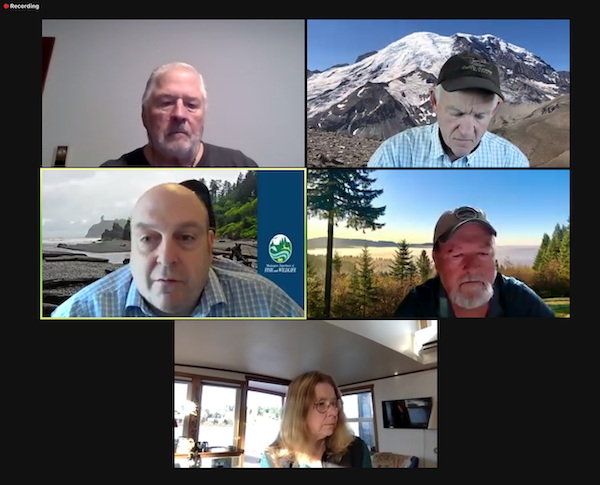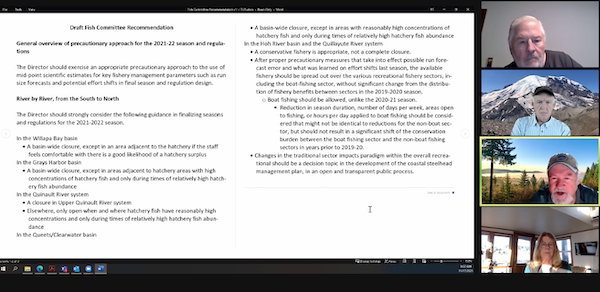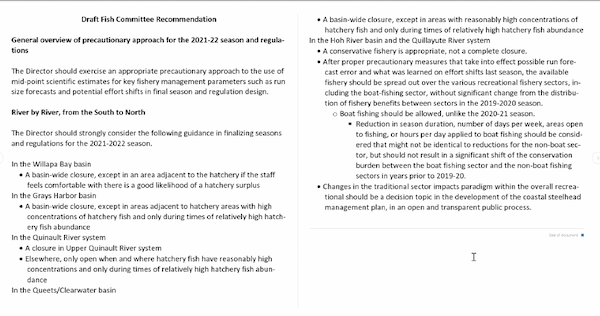WDFW Commissioners Talk Coastal Steelhead
A Washington Fish and Wildlife Commission member’s bid to provide a “recommendation” from the citizen panel to the man who will determine this coming season’s coastal winter steelhead regulations failed this morning, but it also shed more light on WDFW Director Kelly Susewind’s thinking at this late stage.
“Extremely careful or closed” on South Coast streams, “a little piece for everyone” on North Coast rivers.

Susewind also said that if he took any guidance from the unprecedented regs that he set for the 2020-21 season, it was to not again instate a blanket no-fishing-from-a-boat restriction.
Not exactly breaking news, given where things have been going, but also counter to what many polled anglers are calling for, a full closure.
The 95-minute discussion occurred via Zoom and it follows three town halls with stakeholders that began back in July and meetings with tribal comanagers.
With low returns again expected to rivers from Forks south to Naselle, winter steelhead are under a microscope of microscopes. Five of seven coastal systems didn’t hit their escapement goals last year, contributing to an overall coastwide lowest return on record, and the same quintet are projected to miss goal again this winter. Runs are also expected to continue to be low in the coming years due to poor ocean conditions.
But this winter there are projected to be enough steelhead on the other two systems and just enough on four of the others for WDFW to be able to provide some level of fishing for wild and hatchery fish under the statewide management plan and in accordance with one of the agency’s mandates, opportunity.
Commissioner Don McIsaac of Hockinson presented a draft recommendation to the Fish Committee close the South and Central Coast’s Willapa Bay, Grays Harbor, Queets/Clearwater and Upper Quinault systems to fishing except near hatcheries when clipped steelhead are abundant.

And he called for a “conservative fishery” on the North Coast’s Hoh and Quillayute, allowing boat fishing with restrictions such as a reduced season length, fewer open days or hours of the day, or reduced open areas.
At the 35,000-foot level, it actually looks not unlike what Susewind is mulling, and the director allowed that substantively it was what WDFW fishery managers are considering.
But with Susewind aiming to make a decision in early December, McIsaac also wanted fellow Fish Committee members to vote on his recommendations for this Friday’s full meeting of the commission.
He argued that on such a contentious issue, it was fair to provide the director with policy level guidance.
“I guess I think it’s a healthy and appropriate thing for the director to know what we think,” McIsaac said.
Susewind, while acknowledging the role of the commission as his overseer, said he didn’t know that a recommendation vote to the full panel was needed as it put him in a spot as to whether it was guidance or policy.
Before he sets the final season regs, his staffers need to come up with joint management plans with coastal tribes, several of which are also very concerned about the steelhead runs.
In apparent exasperation, Susewind also stated that commission processes were “getting out of control.”

Commissioner Jim Anderson of Buckley expressed concern about holding steelhead fisheries in waters where escapement goals weren’t expected to be met while he said he supported them elsewhere, “albeit highly cautionary and sensitive” to the complexity of returns to all the Quillayute tribs.
Vice Chair Barbara Baker of Olympia said she didn’t believe that the commission needed to take advisory votes on such a complicated plan as McIsaac’s and that staff should be left to do their job.
She said she supported as much opportunity as was possible in the context of recovering steelhead runs at the same time.
Chair Larry Carpenter of Mount Vernon called it a “real difficult issue for us.” It was his surprise last December at the momentous decision Susewind was about to make that led to this year’s much more public process in developing the season regs through stakeholder and public comments.
Susewind recognized that too, saying that without it he’d “do a pretty crappy job” in setting the 2021-22 season.
Both Baker and Carpenter also spoke to not making decisions simply based on the amount of public comment that advocates could generate, i.e., playing the “numbers game,” a thread that sets up a particularly interesting vote on Friday’s 2022 spring black bear permit proposal.
In the end McIsaac said he wouldn’t ask the Fish Committee for a vote on his draft recommendation.
“I like what I heard from our director,” he said.
And that is all the damn time I have for this because I actually have other work to do besides coastal steelhead and spring bears!
